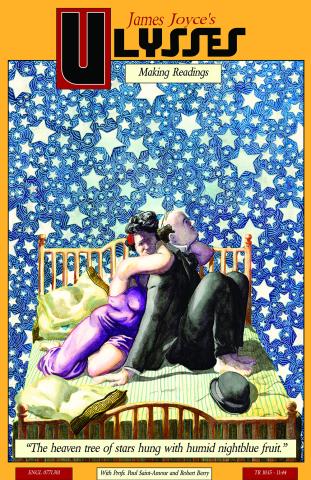Joyce’s Ulysses: Making Readings
James Joyce’s Ulysses was a major literary event well before its publication. Seven years in the writing, the novel was recognized for its ambition, beauty, candor, and originality when it began appearing in serial form in a U.S. literary magazine, only to be confiscated when a court found it unprintably obscene. But because Joyce was stubborn and his patrons generous, Ulysses found its way into print in Paris in 1922, the wonder year of international modernism. Since then, it has inspired dozens of adaptations, prompted many hundreds of scholarly studies, and launched thousands of literary pilgrimages to Dublin, where readers retrace the steps of Joyce’s characters in their latter-day reenactment of Homer’s Odyssey. This course offers an immersive introduction to Ulysses in multiple contexts (Joyce's life; international modernism; Irish literature, history, and politics).
“Joyce’s Ulysses: Making Readings” is a Critical-Creative Approaches course. We’ll devote the first ten weeks of the semester to reading Joyce’s novel alongside selected criticism and adaptations in a variety of media. Discussion, mini-lectures, and student glosses will form the basis of this part of the course. As a transition from Joyce's book to student reading-making, we'll discuss James Hannahan's celebrated 2022 novel, Didn't Nobody Give a Shit What Happened to Carlotta, which draws on both the Odyssey and Ulysses to tell the story of its transfemme "Blatina" protagonist's return home to Brooklyn on parole after doing time upstate for a crime she didn't commit. Carlotta will serve as an inspiration and example as we bend our attention, during the semester's final weeks, to collaborative adaptations of our own, conceiving and producing hybrid creative-critical projects that engage with the novel in some way other than conventional analysis. The invitation here is to see literary interpretation not only as a critical, solitary act but also as a generative, communicative, and social one—and to explore the proufound degree to which interpretation, criticism, and creation are entangled in one another. Your group might co-write an apocryphal episode, complete with schema and annotations. You might write a film or stage adaptation of an episode that benefits from your readings in Joyce criticism. Or you might devise some other approach entirely. (Past years' adaptations include a historiographic cookbook, original musical settings of text from Ulysses, and a side-scrolling video game based on the novel.) The semester will conclude with a project fair open to the department community. Our co-instructor and primary consultant on the final projects will be Rob Berry, the artist behind Ulysses ‘Seen,’ the internationally acclaimed digital comics adaptation of Joyce’s novel.

 Department of English
Department of English
